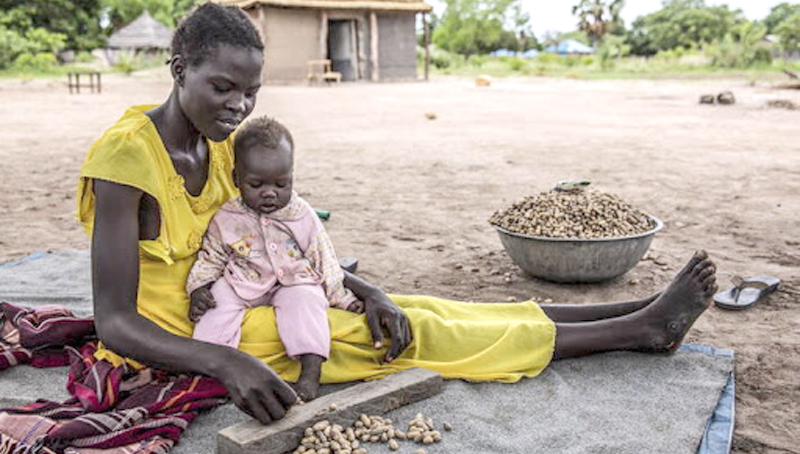
Rome - FAO Director-General QU Dongyu, Italy’s President Sergio Mattarella, Pope Francis, and others made a passionate call for tangible action, innovative solutions, and continued commitment to rebuild a better, greener world anchored in efficient, resilient, inclusive and sustainable agri-food food systems that can provide healthy and affordable diets for all, and resist future crises at the launch of the 42nd session of the FAO Conference last week. The Conference takes place every two years and is FAO’s supreme governing body. It determines the policies of the Organization, approves the budget, and makes recommendations to Members on food and agriculture issues.
For the first time ever, the FAO Conference is held in virtual mode. The opening session saw a record-breaking number of participants from around the world - over 1,300 people, including 119 Ministers and Vice Ministers. The Conference began with messages from Italy’s President Sergio Mattarella, and Pope Francis. President Mattarella highlighted the impact of Covid-19 on agri-food systems and urged for: achieving the Sustainable Development Goals with renewed determination; addressing rising food insecurity, and moving towards sustainable development inspired by SDG2 - zero hunger. He outlined Italy’s role in supporting COVID-19 recovery efforts and agri-food systems’ transformation through its current presidency of G20. He also alluded to his country’s support of the Food Coalition and the UN pre-Food System Summit - to be held in Rome next month, and as co-chair of COP26 UN climate change conference.
The message of Pope Francis was delivered by the Permanent Observer of the Holy See to FAO, Monseigneur Fernando Chica Arellano. It called for a culture of care and peace and the rejection of the virus of indifference. The Pope underscored the need for: developing a circular economy that guarantees resources for all; adopting policies that can tackle the structural causes of rising hunger, promoting sustainable and diversified agriculture, making the most of innovation, and supporting small-scale farmers. The Pope highlighted FAO’s work to tackle food insecurity and malnutrition, considering it of particular relevance at present.
FAO Director-General, Qu Dongyu, set the scene for the week-long conference summarising the challenges the world faced today - chief amongst them, the impacts of COVID-19, rising hunger and acute food insecurity but also malnutrition, unaffordable healthy diets, endemic poverty and inequality, and a more fragile environment.
“More than a year into the pandemic, we are witnessing the scale of its long-term effects on the agri-food systems, and how it has worsened the food security and nutrition situation around the world and especially in food crises countries,” he noted.
“To get to where we need to be by 2030, we must: perceive the challenges facing us through an agri-food systems lens; and act holistically,” underscored Qu.
And to make this happen, the Director-General put emphasis on science, innovation, and digital applications - billing them as essential blocks in the future of agriculture.
FAO is already on the right path to build this future, went on Qu as he outlined some of the UN agency’s key innovative and digital initiatives in food and agriculture:
• The Hand-in-Hand Initiative, which has been gaining strength as a mechanism for bringing diverse actors together to help the least advantaged countries and people to eradicate poverty, end hunger and malnutrition, and to reduce inequalities. Thirty-nine FAO Members have joined the initiative so far.
• The Hand-in-Hand initiative’s Geospatial Platform with Big Data analysis and advanced geo-spatial modelling has over 38,000 users from nearly all FAO Members.
• The 1,000 Digital Villages programme, which focuses on digital technologies to improve production and agri-business management. The Programme incorporates: “E-Agriculture” to improve productivity using information and communication technologies (ICT) and relevant digital solutions; “Digital Farmer Services” to enhance farmers’ accessibility to social and economic services; and digital services for “Rural transformation” to enhance the delivery of public services in health, education, jobs, welfare, eco-tourism, and agri-tourism.
FAO is also continuing to spearhead the holistic concept of a digital organization within the UN family, being well ahead of the curve, noted the Director-General.
He illustrated his presentation with slides in all six FAO official languages - another testimony to FAO’s new and innovative ways - showing the food and agriculture challenges and solutions.
This is Qu’s first Conference as Director-General since he was elected at the last conference two years ago. He talked about the transformations he had introduced to the Organization since taking office.
“From day one as your Director-General, I worked entirely to forge world-class internal governance and organisational culture,” said Qu.
In line with this, in the past 22 months, “FAO underwent the deepest transformative action since its creation. We established a modular and flexible structure that allows for optimal cross-sectoral collaboration. This answers Members’ priorities and responds best to emerging needs,” said the Director-General
